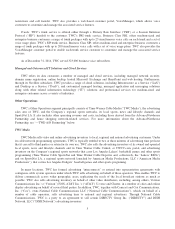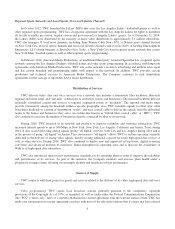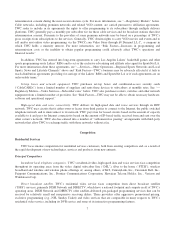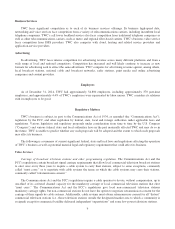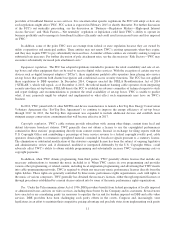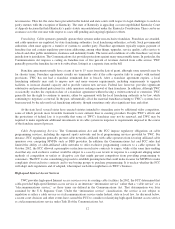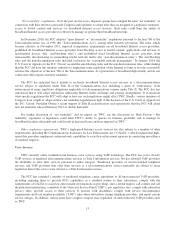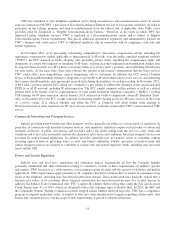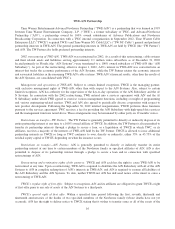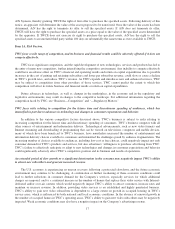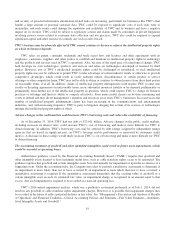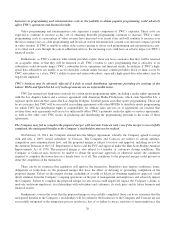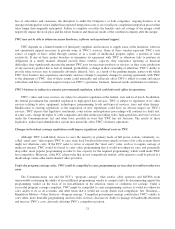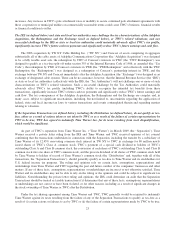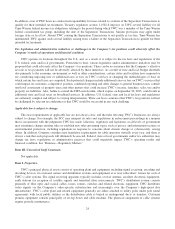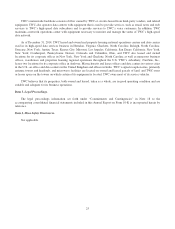Time Warner Cable 2014 Annual Report Download - page 23
Download and view the complete annual report
Please find page 23 of the 2014 Time Warner Cable annual report below. You can navigate through the pages in the report by either clicking on the pages listed below, or by using the keyword search tool below to find specific information within the annual report.TWC is also subject to state and federal “do not call” laws restricting telemarketing and state and federal laws
restricting unsolicited commercial emails. Additional and more restrictive requirements may be imposed if and to the
extent that state or local authorities establish their own privacy or security standards or if Congress enacts new privacy or
security legislation.
Environmental Regulation
TWC’s business operations are subject to environmental laws and regulations, including regulations governing the
use, storage, disposal of, and exposure to, hazardous materials, the release of pollutants into the environment and the
remediation of contamination. TWC is currently subject to an investigation by the California Attorney General and the
Alameda County, California District Attorney regarding whether certain of TWC’s waste disposal policies, procedures
and practices are in violation of the California Business and Professions Code and the California Health and Safety Code.
For additional information about this investigation, see Note 18 to the accompanying consolidated financial statements.
As a result of the increasing public awareness concerning the importance of environmental regulations, these regulations
have become more stringent over time, and pending or proposed regulations, such as regulations addressing climate
change concerns, including greenhouse gas emission limits or cap and trade programs, could impact TWC’s operations
and costs.
Other Federal Regulatory Requirements
Federal law also includes numerous other requirements applicable to some extent to TWC’s business or one or more
of TWC’s services. These provisions apply to customer service, use of credit reports, marketing practices, equal
employment opportunity, technical standards and equipment compatibility, antenna structure notification, marking,
lighting, emergency alert system requirements, disability access, loudness of commercial advertisements and the
collection of annual regulatory fees, which are calculated based on the number of subscribers served, the types of FCC
licenses held and certain interstate revenue thresholds. In addition, there are various rules prohibiting joint ownership of
cable systems and other kinds of communications facilities. Relatedly, the FCC has sought to place limits on the number
of (i) subscribers a cable operator may reach through systems in which it holds an ownership interest, and (ii) affiliated
programming channels that a cable operator may carry on a cable system. The FCC also actively regulates other aspects of
TWC’s video services, including the mandatory blackout of syndicated, network and sports programming; customer
service standards; political advertising; indecent or obscene programming; Emergency Alert System requirements for
analog and digital services; commercial restrictions on children’s programming; recordkeeping and public file access
requirements; and technical rules relating to operation of the cable network.
In addition, TWC’s video, Internet access and voice services are subject to a number of requirements related to
ensuring that the services are accessible to individuals with disabilities. Among other things, TWC’s voice services and
email service must be accessible to and usable by persons with disabilities. TWC also is required to include closed
captioning on certain video programming delivered to its customers and pass through video description information on
certain of its video services. In October 2013, pursuant to the Twenty-First Century Communications and Video
Accessibility Act of 2010, the FCC began adopting updated rules mandating audible accessibility of on-screen text menus
and guides on cable set-top boxes and requiring closed captioning to be more easily activated on those devices. The FCC
has several ongoing proceedings regarding the quality of closed captioning, captioning of online clips and other related
issues.
TWC is unable to predict how these various regulations might be amended in the future and whether and how any
such changes might affect its business. In addition, while TWC believes that it is in substantial compliance with FCC and
state regulations, it is occasionally subject to enforcement actions at the FCC, which can result in the payment of fines or
the imposition of other agency sanctions.
15


